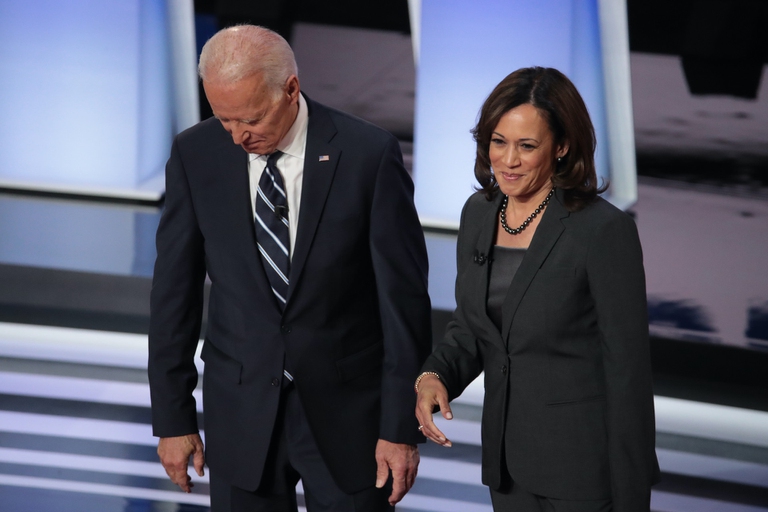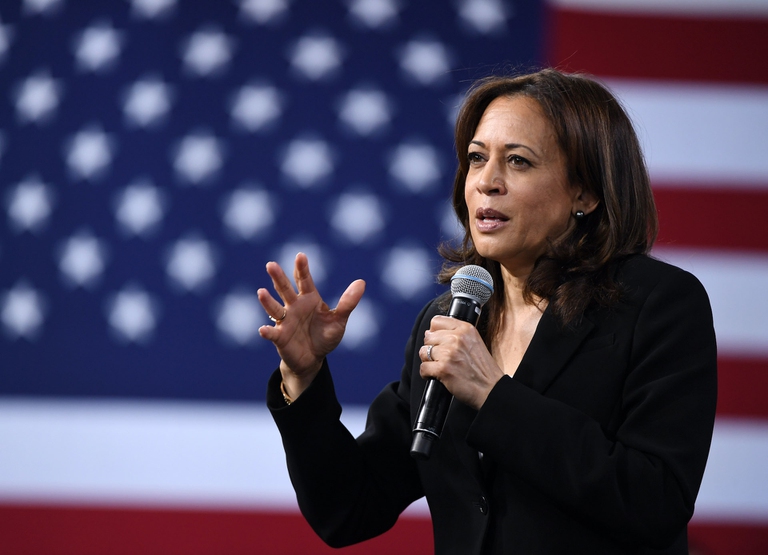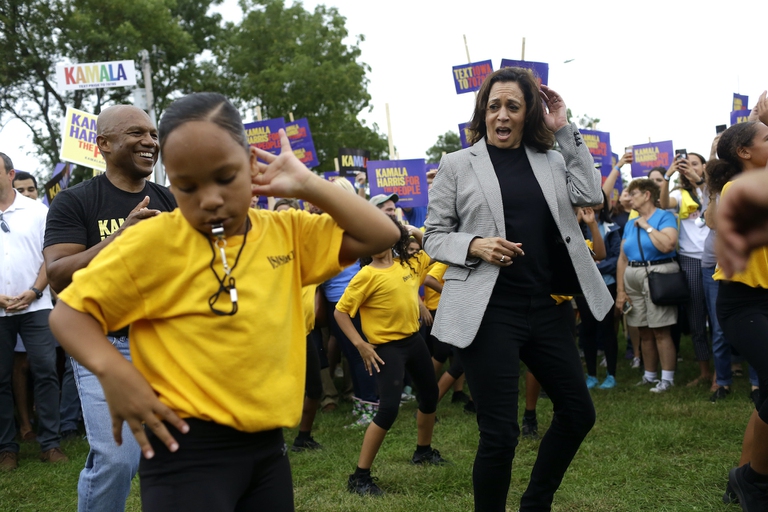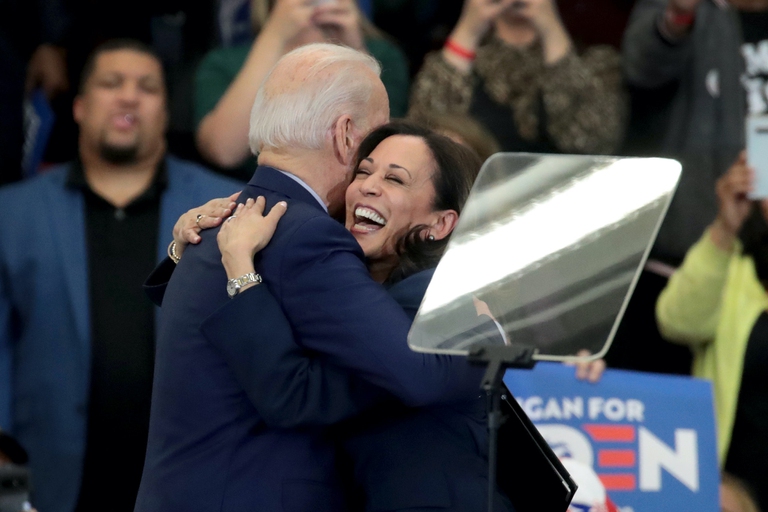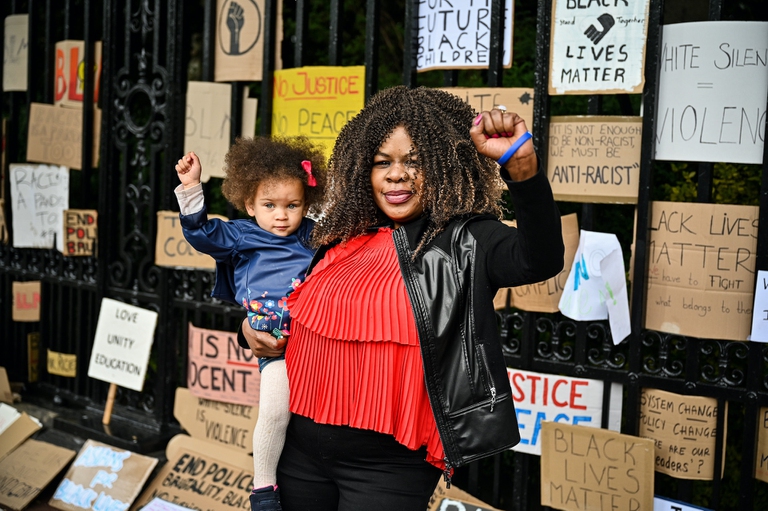Let’s go win this, @KamalaHarris. pic.twitter.com/O2EYo6rYyk
— Joe Biden (@JoeBiden) August 12, 2020

Next stop Washington D.C. A report from the streets of the United States capital on the day of President Joe Biden’s inauguration.
The second black female US senator has become the first black female vice-president. Kamala Harris and Joe Biden have made history.
Kamala Harris. A name that has gone down in history because, after the election of Joe Biden, she’s the first black woman and Asian-American to be chosen as vice-president by one of the major parties (Democrats and Republicans). She has worked alongside the Democratic presidential candidate over the course of the election campaign against Donald Trump and his VP Mike Pence. After Biden promised he would choose a woman back in March, the official announcement came on Tuesday the 11th of August. His ex-rival at the primaries has now become a key ally.
Harris’ candidacy reflects the current political climate in the United States. Her mixed background – with an Indian-born mother and Jamaican-born father – mirrors the electorate’s heterogeneity in a country in which minorities struggle daily against profound inequalities. Furthermore, her legal career first as San Francisco’s district attorney then as attorney general of the state of California gives her a certain clout in tackling the topics of institutional racism in the justice system and police brutality, which have dominated public debate since the killing of George Floyd on the 25th of May.
People are protesting because Black people have been treated as less than human in America. Because our country has never fully addressed the systemic racism that has plagued it since its earliest days. It is the duty of every American to fix. No longer can some wait on the sidelines, hoping for incremental change. In times like this, silence is complicity.
“The political atmosphere that took hold after the killing of Mr. Floyd in Minneapolis seemed to demand a running mate who could speak with great authority on matters of systemic racism, law enforcement and social inequity – and there’s little doubt that Ms. Harris will be called upon to do just that,” writes the New York Times. Like many of those who have taken to the streets these past months, Harris seeks police and judicial reform, and has also publicly demanded the arrest of the police officers who killed Breonna Taylor, a 26-year-old African-American woman, on the 13th of March 2020.
Harris describes herself as a “progressive prosecutor” and emphasised her left-leaning values and policies during her campaign for the primaries, which ended in December after a promising start. At the same time, she hasn’t come out in support of the movement to defund the police, just like Biden. With him, she shares the label of a moderate candidate.
No, we’re not going to get rid of the police. We all have to be practical. But let’s separate out these discussions. Many cities in our country spend one third of their entire budget on policing … Put it in the context of the fact that over the last decades we’ve essentially been defunding public schools.
Born in Oakland, California, in 1954, following her parents’ divorce she was raised primarily by her mother Shyamala Gopalan Harris, a cancer researcher and civil rights activist. “My mother understood very well that she was raising two black daughters,” Harris writes in her autobiography The Truths We Hold, so she chose to immerse her and sister Maya fully in African-American culture. Harris says she feels comfortable in her identity as an American: “I am who I am. I’m good with it. You might need to figure it out, but I’m fine with it,” she told the Washington Post, commenting on the tendency to label politicians according to their ethnicity or background.
She received a degree from historically black Howard University, describing this experience as one of the most formative of her life. Following studies in law at the University of California Hastings, she began her career in the Alameda district attorney’s office, in her home state.
She was district attorney of San Francisco between 2004 and 2011 and became the first woman and first black person to assume the role of attorney general of California, from 2011 to 2017. Her two mandates as head of the justice department of the US’ most populous state were at the centre of her campaign for the Democratic primaries. Harris underlined her progressive policy choices such as the adoption of body cams by certain agents in California, the first state to implement them, and the launching of a public crime database.
However, according to her critics, “time after time, when progressives urged her to embrace criminal justice reforms, Harris opposed them or stayed silent,” University of San Francisco Lara Bazelon wrote on the New York Times last year. For example, she’s fallen under the spotlight for rejecting African-American death row inmate Kevin Cooper‘s request for advance DNA testing that could shed light on the crimes he’s accused of, which date back to the 1980s.
In 2016 she became the second black woman to be elected to the United States Senate, representing California. Her campaign for the White House began three years later: Harris chose a symbolic date – the 15th of January, Martin Luther King‘s birthday – to announce it. At the start of the primaries she was considered one of the top candidates, especially thanks to her solid debate performance, in which she fields her talents as a lawyer. In particular, during the first Democratic debate, she confronted Biden on the topic of racism, criticising him for his opposition to busing, employed in the US to reduce racial segregation in schools.
I don’t believe you’re a racist. I agree with you when you commit yourself to the importance of finding common ground, but I also believe – and it’s personal – it was hurtful to hear you talk about the reputations of two United States senators who built their reputations and career on the segregation of race in this country. It wasn’t only that, but you also worked with them to oppose busing. There was a little girl in California who was part of the second class to integrate her public schools and she was bussed to school every day. That little girl was me.
27 June 2019
Notwithstanding such memorable moments, in trying to appeal to moderate as well as progressive voters, Harris ended up convincing neither, also due to ambiguous stances on key issues like healthcare. After having come out in favour of Bernie Sanders‘ Medicare for all campaign for universal affordable health coverage, she vacillated during the campaign, failing to clearly state her position. In the end, she dropped out before the inaugural primaries in Iowa.
Overall, the Biden campaign has stressed a theme dear to Democratic voters, the environment, including proposing a plan to “secure environmental justice and equitable economic opportunity in a clean energy future,” which aims to reach zero net CO2 emissions by 2050.
According to American environmental news websites Grist and Green Tech Media, Harris could boost the presidential candidate’s climate ambitions. As well as releasing her own environmental programme during the primary campaign, she’s been particularly active in her role as senator. Just a few days ago she introduced the Climate Equity Act together with representative Alexandria Ocasio-Cortez, a draft law that puts racial justice and social equality at the centre of environmental policy and the Green New Deal.
From wildfires in the West to hurricanes in the East, to floods and droughts in the heartland, we’re not going to buy the lie. We’re going to act, based on science fact, not science fiction.
They’re causing harm and death in communities. And there’s been no accountability. Certainly not by this administration, nor, and I hate to say it so generally, by the Republicans in Congress.
It’s time to end mass incarceration. This includes legalising marijuana, sentencing reforms, and abolishing private prisons. With the addition of job training and education, these actions will reduce crime and help build healthy communities.
President (Trump)’s immigration actions … will make America less safe. I’ve personally prosecuted everything from low-level offences to homicides. I know what a crime looks like. I will tell you: an undocumented immigrant isn’t a criminal.
Upon being elected, I’ll give the United States Congress a hundred days to get their act together and have the courage to pass reasonable gun safety laws. If they fail to do it, then I’ll take executive action.
Women have value. Women have authority to make decisions about their own lives and their own bodies. And let me just tell you, as president, I’ll fight every day for a woman to make the decision for herself.
Black women are one of the Democratic Party’s core constituencies. They’re among its most faithful voters and without them, say political commentators, Biden wouldn’t have won the primaries. They play a fundamental role in the country’s politics, in which they participate actively: 70 per cent of eligible black women voted in the 2012 presidential elections and 64 per cent cast their ballot in 2016, versus a general turnout of around 55 per cent in both cases.
But they earn just 64 cents for every dollar an American man puts in his pocket, and while they make up 7.5 per cent of the electorate, there’s never been a black female governor, let alone president or vice-president, and only two have been elected to the Senate. One of them being Kamala Harris who, together with Joe Biden, is now called to convince the majority of voters that their vision of an anti-racist and fairer America is the best cure for its ills.
Siamo anche su WhatsApp. Segui il canale ufficiale LifeGate per restare aggiornata, aggiornato sulle ultime notizie e sulle nostre attività.
![]()
Quest'opera è distribuita con Licenza Creative Commons Attribuzione - Non commerciale - Non opere derivate 4.0 Internazionale.
Next stop Washington D.C. A report from the streets of the United States capital on the day of President Joe Biden’s inauguration.
With Joe Biden as US president, the entire international community will be aligned on the climate crisis. We can’t let this chance slip away.
Joe Biden obtained more votes than any other candidate in US election history and is en route to becoming the 46th president of the United States.
From Nepal to Morocco, from Madagascar to Peru, many antigovernamental protests that took place these weeks were led by Gen Z protesters.
With a clearer picture of the results, how have countries across the world reacted to the 2020 US elections? What expectations face president-elect Biden?
We wait, suspended in time, to find out who the next president of the United States will be. The results as they stand show a divided country.
New York holds its breath. A report from our correspondent in the Big Apple on the 3rd of November, the day of the 2020 US elections.
Joe Biden breaks ahead. Sanders falls but stays in the race. Bloomberg is hanging by a thread. Warren is invisible. The final results of Super Tuesday, a key day in the Democratic primaries to choose the candidate for the the US presidential elections.
The Democratic party primaries in the US started on the 3rd of February. We discuss the five frontrunners, one of whom will challenge Donald Trump for the presidency on the 3rd of November 2020.
